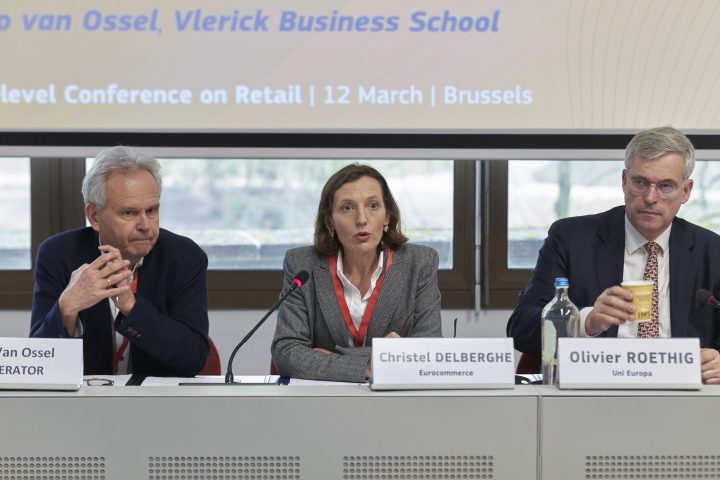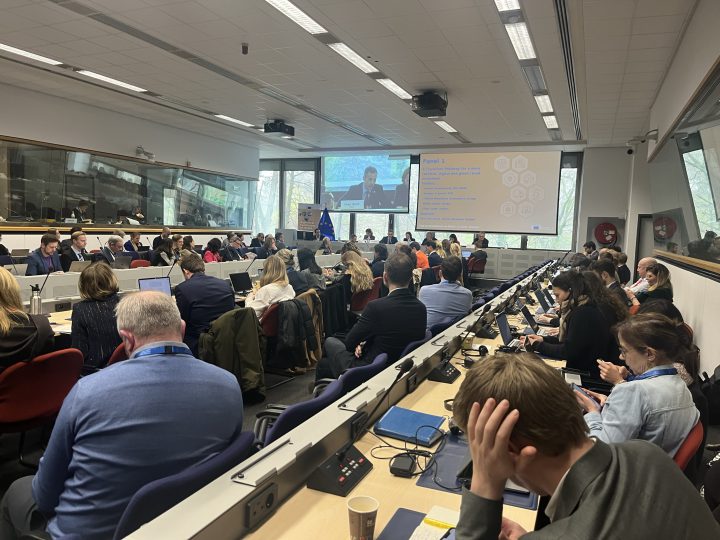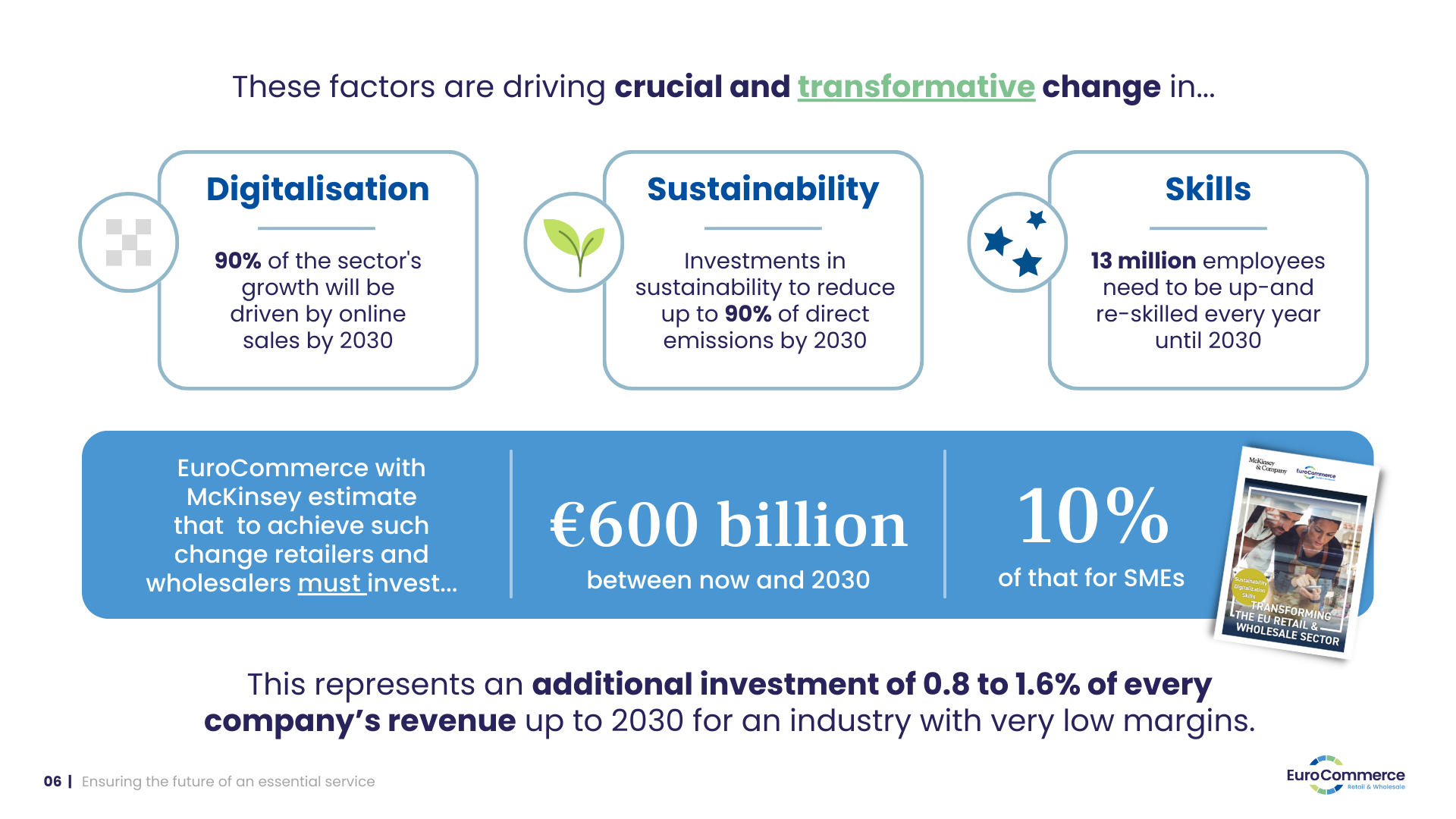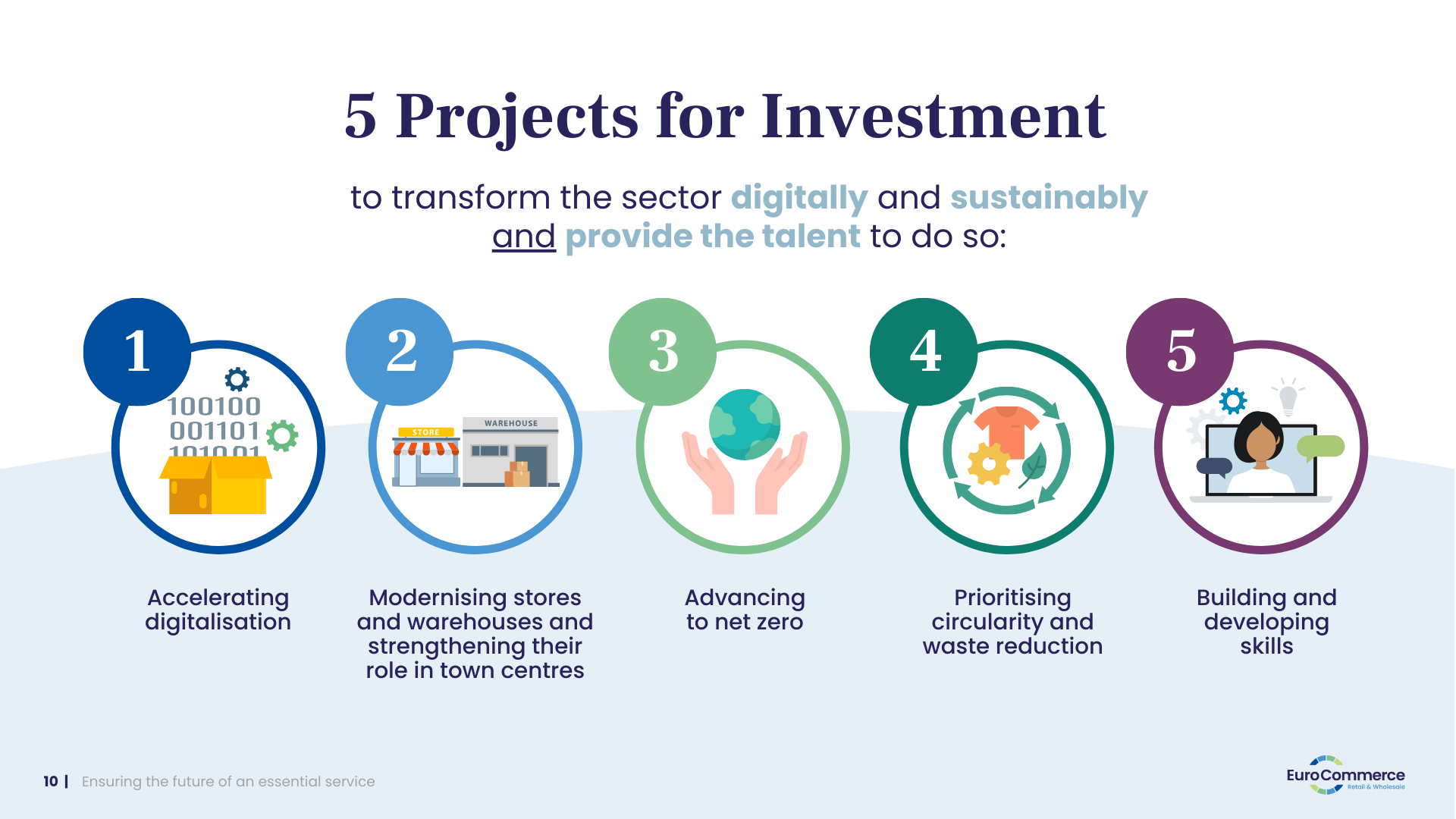
The Retail Transition Pathway was launched on 12 March. It is an action plan built on what has been learned in the last few years and co-created, bringing together many different actors that are involved in the ecosystem. It identifies what is needed for retailers and wholesalers to achieve the sustainability, digitalisation, and skills transformation and be more competitive and resilient.
The launch conference gave the chance to highlight what businesses are already doing and confirmation that this is about working together at EU, national, regional and local level and with all the actors involved, whether companies, associations, supply chain partners, farmers, trade unions, education providers or the towns and cities. The conference was also an occasion to help the retail ecosystem get its contribution recognised and build the momentum so the actions identified for retail and wholesale are acted upon in the next mandate.


Why is this important?
The Commission has recognised itself that retail is the largest industrial ecosystem. Retail and wholesale is the largest private employer in the EU employing 26 million or 1 in 7 jobs, contributing to 10% of EU GDP and supporting millions of jobs in supply chains from small suppliers to major international companies. During the pandemic, the sector ensured that consumers were able to still find and buy their daily stapples.
Our sector supports entrepreneurship with over 99% of the 5 million retail and wholesale companies being SMEs (1 in 4 of all EU SMEs). The sector plays a key role in local communities and the life and attractiveness of cities, smaller towns and villages.
For retail and wholesale to remain competitive and better serve the millions of business customers and EU consumers, we need the ability to invest and grow our businesses. This will help the EU reach its climate, digitalisation and skills goals. In 2022, we identified in a study with McKinsey that the retail and wholesale sector needs to invest up to €600 billion for its sustainability and digitalisation transformation and for the talent that underpins that. We see the transition pathway as a tool that will ensure that national and EU policymakers support and prioritise our sector’s transformation.

This is why we prepared a thorough contribution to both the retail and agri-food ecosystems, building on the work already done looking at the five key projects that the sector needs for transformation, to ensure that plans match what retailers and wholesalers need, and their potential.
What do we want to come next

What we want to see is that the transition pathway really results in driving the Single Market. A well-functioning and more competitive retail ecosystem particularly, when coupled with a manageable regulatory environment, is what underpins the vision for the future the transition pathway contains and its future success. This requires regulation that is practicable and avoids disruptions, such as rules on strict payment terms that will hinder the ability to finance operations or afford investment, and really acts on the barriers that we regularly document.
There needs to be a good foundation for transformation supported by infrastructure, access to recycled raw materials, technological advancements, consumer awareness, the matching of real estate to needs, a future well-trained and prepared workforce and an understanding of how the value chain operates.
There also needs to be action to overcome barriers to investment to ensure that retailers and wholesalers have financial support, incentives to invest, an increase in the uptake of R&I funding or development of public-private partners and, action to address the skills gap.
This requires working together. By sharing best practices to learn what retailers and wholesalers are already doing and achieving, including advancements in decarbonisation, packaging, reduction of food waste, recycling, and consumer communication to encourage initiatives in harmony with what is already happening. It needs steps that help raise the profile of career opportunities within the sector. As well, building on the importance of collaboration, whether to facilitate sustainability transformation or more day-to-day operations for example on agreeing mutually beneficial payment terms and supporting workers.
Our willingness to work together for a joint future
The size and contribution of retail and wholesale means that it has the potential to contribute to the EU’s climate, societal, digitalisation and skills goals. In other words, what retail and wholesale does has a positive impact for the EU due to our everyday contact with consumers and businesses. Our position in the value chain means we can also support change e.g., by suppliers for example, through capacity building.
Our hope is that as the Commission starts to prepare mission letters for the incoming Commissioners, the Single Market and the transition pathways are put at the centre. That the Commission recognises that retail and wholesale is a strong partner to resilience, digitalisation and sustainability. That the momentum started by the conference is maintained. The transition pathway is just a first step that needs to gain momentum in the next mandate – so that the existing ideas can be accelerated and developed further with new enthusiasm. We look forward to taking part.
Background
The EU’s Industrial Strategy was released in March 2020. The shock of the pandemic meant that an update was needed a year later, to focus on increasing the resilience and supporting the digital and sustainability transition of EU industry. To achieve this a new idea was born in the form of transition pathways. A valuable Commission initiative that works with stakeholders to develop an actionable plan to increase resilience, sustainability and digitalisation for each industrial ecosystem. Taking on board the lessons learned from the pandemic, the energy crisis and disruptions caused by the invasion of Ukraine to strive toward a more competitive EU.
The variety of retail and wholesale makes it relevant to many different ecosystems, particularly agri-food and textile, as well as it deserving its own place – the retail ecosystem.
Note to the editor.
EuroCommerce also published an article and a video on this issue:
Video link: https://youtu.be/teUTpSPKbbg?si=jtZk6VPRnqfFzMXg
Leena Whittaker
Director, Competitiveness

Leena is EuroCommerce’s Director of Competitiveness coordinating advocacy on retail and wholesale ecosystem competitiveness. She is British and has a practical knowledge of EU policy-making from her experience as a legal and policy officer in the European Commission (DG GROW) and is a qualified UK lawyer.
